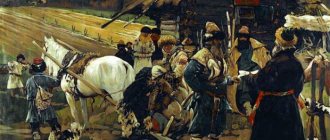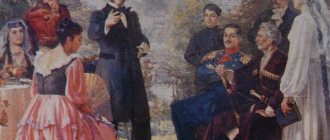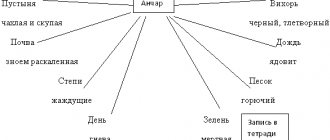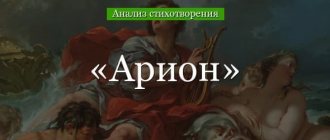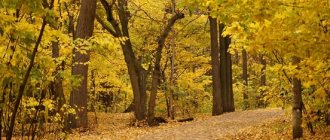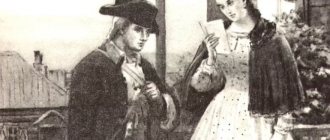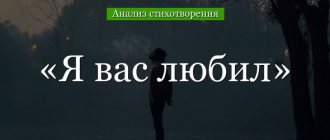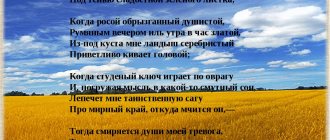History of creation
The poem was written during the so-called “St. Petersburg period” of Pushkin’s life. At this time, the poet actively participates in the political life of the country and even communicates with the Decembrists. He feels responsible for what is happening in the country. It seems to Pushkin that right now everything can be changed for the better - and he must take part in these changes. The poet creates the poem “Village,” in which he tells the whole truth about the cruelty of serfdom and the hopelessness of the life of the peasants.
Literary movement: romanticism.
Literary genre: elegy.
Type of lyrics: historical, philosophical.
Essay on the topic: Analysis of the poem by A.S. Pushkin "Village"
Composition. Analysis of the poem by A.S. Pushkin "Village"
The poem “Village” was written by Pushkin in 1819, during the so-called “St. Petersburg” period of his work. For the poet, this was a time of active participation in the socio-political life of the country, visiting the secret union of the Decembrists, friendship with Ryleev, Lunin, Chaadaev. The most important issues for Pushkin during this period were the social structure of Russia, the social and political lack of freedom of many people, the despotism of the autocratic-serf system of government... Thus, the poet devotes the poem “Village” to the problem of serfdom, which worried many thinking people of that time. The poem has a two-part composition: the first part (before the words “... but the thought is terrible ...") is an idyll, while the second is a political declaration, an appeal to the powers that be. For the lyrical hero, the village is, on the one hand, a “desert corner”, a kind of ideal world where silence and harmony reign. In this land, “a haven of peace, work and inspiration,” the hero gains spiritual freedom and indulges in “creative thoughts.” The images of this part of the poem: “a dark garden with its coolness and flowers”, “light streams”, “striped fields”, “huts scattered in the distance”, “winged mills” - are undoubtedly romanticized, which creates an idyllic picture of peace and tranquility. But a completely different side of life in the village is revealed to us in the second part, where the poet mercilessly exposes the ugliness of social relations, the arbitrariness of the landowners and the powerless situation of the people. “Wild lordship” and “skinny slavery,” the main images of this part, embody the “murderous shame of ignorance,” all the irregularity and inhumanity of serfdom. The lyrical hero, identified with the poet himself, calling himself a “friend of humanity,” does not accept this injustice and lawlessness, wants to “disturb the hearts of ...” people, exposing the excesses of the landowners and the hopelessness of the life of the peasants, dreams of seeing “an unoppressed people” and “an enlightened fatherland of freedom.” The world surrounding the hero is full of cruelty and violence, a world where some “are dragged with a painful yoke to the grave,” and others, “not seeing tears, not listening to groans,” “have appropriated to themselves the labor, property, and time of the farmer,” looks especially ugly against the backdrop of beautiful, harmonious nature, the kingdom of “happiness and oblivion.” In this way, a contrast is created between the two parts of the poem, allowing us to highlight with particular force the idea of inferiority, the impossibility of the existence of serfdom. The poet also uses many figurative and expressive means of language. In the first part they create a romantic and peaceful atmosphere: “the stream of my days flows”, “winged mills”, “azure plains of lakes”, “peaceful noise of oak forests”, “silence of fields”. And in the second part, the poet uses visual means to most clearly expose the ugliness of the social system: “... a violent vine,” “an alien plow,” “exhausted slaves,” “an inexorable owner.” In addition, the last seven lines of the poem are filled with rhetorical questions and exclamations, because they have the nature of an appeal to others, expressing the indignation of the lyrical hero and his reluctance to put up with the unjust structure of society. The meter of the poem is iambic hexameter. The rhyme is both masculine and feminine, both cross and circular: I greet you, deserted corner (Yasenskaya), Shelter of peace, work and inspiration (male), Where the invisible stream of my days flows (f.) In the bosom of happiness and oblivion (m.) (cross rhyme a-b-a-b). I am yours - I love this dark garden With its coolness and flowers, This meadow filled with fragrant stacks, Where bright streams rustle in the bushes (ring rhyme a-b-b-a).
novstudent.ru | 10/22/2012
Subject
The lyrical hero welcomes the village, glorifies it and asserts the superiority of this beautiful natural corner over social life, noisy and stupid feasts. The hero describes the beauty of the village - gardens with flowers and meadows with streams, lakes, hills, fields and houses. It is here that the lyrical hero seeks the truth, learns not to grumble, accept the law, sympathize with people and refrain from envy. It is in the village that that age-old wisdom comes to him, which is brought to him by the “oracles of the ages” (an allegorical image synonymous with the image of the muse).
However, the lyrical hero is struck by the contrast between the beautiful nature of the village and the terrifying ignorance reigning in it. The nobility asserted its rights through violence, and the serfs became silent slaves.
The lyrical hero complains about a lack of eloquence: he would like to be able to speak about the problem in such a way that the king would abolish serfdom and a new - free - life would begin.
Poems about the village
You are my abandoned land, You are my land, a wasteland, Unmown hayfield, Forest and monastery.
The huts were worried, and there were only five of them. Their roofs foamed into the glow of the road.
Under the straw-riza The rafters were planed, The wind sprinkled the blue mold with the Sun.
The crows beat on the windows without missing a beat, Like a blizzard, the bird cherry flaps its sleeve.
Didn’t the twig tell your life and reality, What the feather grass whispered to the traveler in the evening?
I’m here again, in my own family (Yesenin’s poem about childhood and the village)
I am here again, in my dear family, My land, thoughtful and gentle! The curly twilight behind the mountain waves its snow-white hand.
The gray hairs of a cloudy day float disheveled by, And the sadness of the evening worries me irresistibly.
Above the dome of the church domes, the shadow of the dawn fell lower. O other games and amusements, I will never see you again!
The years have sunk into oblivion, and so have you gone somewhere. And only the water still makes noise behind the winged mill.
And often in the evening darkness, Under the ringing of broken sedge, I pray to the smoking earth For the irrevocable and distant.
Dilapidated hut (Yesenin)
A dilapidated hut of grief and worries, The blizzard often cries at your gate.
Complaints about poverty are often heard behind your wall, Songs sound dull.
Everyone sings about grief, about heavy oppression, about desperate need and a hungry year.
There are no cheerful songs within your walls, because grief drowns them out.
Village (Nekrasov)
I love driving up to the village in the evening, watching the flock of Crows play with my eyes over the old church; Among large fields, reserved meadows, On the quiet shores of bays and ponds, I love to listen to the barking
The watchful dogs, the lowing of heavy herds, I love the abandoned and desolate garden And the unshakable shadows of linden trees; The glass wave does not tremble the air; You stand and listen - and your chest is intoxicated with the Bliss of serene laziness...
You look thoughtfully at the faces of the men - And you understand them; I myself am ready to surrender to Their poor, simple life... An old woman goes to the well for water; The tall pole creaks and bends; One by one the horses approach the trough...
A passerby began to sing a song... Sad, but he shouted dashingly - and only the knocking of the wheels of his cart could be heard shaking; A girl comes out onto the low porch - And looks at the dawn... and her round face turns bright scarlet.
Swinging slowly, from the hill behind the village, Huge carts descend in single file With the fragrant tribute of a lush cornfield; Behind the hemp, green and thick, . They run, dressed in blue fog, wide floods of the steppes.
That steppe - there is no end to it... spread out, lies... The flowing breeze runs, will not pass... The earth languishes, the sky grows dim... And the sides of the long forests will be covered with golden crimson, and it grumbles slightly, And subsides, and turns blue...
And I dreamed that in autumn (Bunin)
... And I dreamed that on a cold autumn night I returned home. I walked along a dark road alone To a familiar estate, to my native village... The frozen branches of the vines crackled From the stormy wind on the old rampart... The village was sleeping... And with fear, like a thief, I entered the deserted, abandoned courtyard.
And my heart sank with pain when I looked around at the fire! The ceiling is hanging, the corners are collapsing, Floors are creaking underfoot everywhere, And it smells like stoves... Abandoned, forgotten, Forgotten forever, our dear home! Why am I here? What remains in it, and if it remains, what does it mean?
And I dreamed that all night I walked through the garden, where the wind swirled and howled, I was looking for the spruce planted by my father, I was looking for those rooms where the family gathered, Where my mother rocked my cradle and caressed me with tender sadness, - With insane longing for someone... then I called, And the naked garden hummed and groaned...
There are villages in Russia
There are villages in Russia that are far from the world. Slowly, little by little, old people grow old in them. *** Childhood is somewhere across the river, Youth lives in the twilight... Who gives them water? Who feeds them? Who sings them songs? *** Only rain, lost in the summer, Bird talk in silence, Only the sky with winter light, And geraniums on the window. *** But the grief has not eaten into the faces, And there is no heavy melancholy: Apparently, I am still dreaming of something, Something good, like light. *** Apparently, they don’t put us in harm’s way. That we do not feel sin, And with withered fingers they baptize us from afar.
And I don’t hide the fact that I come from a village
And I don’t hide the fact that I come from a village, That I ran through puddles barefoot as a child. Ten kilometers away, in any bad weather, I went to school with the children, back and forth, on foot.
And I don’t hide that I come from a village, That I slurped soup and cabbage soup with a wooden spoon. And in a reliable, proven, folk way, my mother treated me on a “fiery” stove.
And I don’t hide the fact that I come from a village, I went to pick mushrooms in the neighboring forests, And I felt happiness, my soul, freedom, When, falling on the grass, I looked into the sky.
And I don’t hide that I come from a village, That I once had to live in poverty, in work, But only the years I lived there taught me Love and respect, and to appreciate people’s work.
And I don’t hide the fact that I come from a village. I’ll tell you without coquetry that I’m proud of it! And I feel in my soul that I am a child of nature... Even if they consider me a hillbilly, let it be.
And I don’t hide the fact that I come from a village. Now I don’t have to see such sunsets. And the years will not erase my village from memory. Thank you, Lord, that I had the opportunity to live there.
And I don’t hide the fact that I come from a village, so accept it as it is. I won’t change to please anyone. I was born in a village, and I am praised and honored.
My native village
My native village, My house is near the river. The water is very close. It flows, makes noise, and shines. And bright dragonflies scurry over the reeds. The picture is so pleasing, And there is comfort in my soul! Green hills are visible. Trees grow there, Foxes, wolves, hares - everyone lives here, My favorite village! You are already 200 years old! But for me there is no more wonderful land in the world!
Tropes and figures of speech
Epithets: “deserted corner”, “luxurious feasts”, “peaceful noise”, “free idleness”.
Metaphors: “my days are an invisible stream”; “for free idleness”, “a friend of reflection”.
Allegory: “Oracles of the Ages.”
Archaic words: “orbit is a formidable gift” (oratory here is eloquence).
Repetitions: and, on, here.
Rhetorical question: “Why is there a barren heat burning in my chest / And has not the fate of oracle given me a formidable gift?”, “And over the fatherland of enlightened freedom / Will a beautiful dawn finally rise?”
Rhetorical exclamation: “Oracles of the ages, here I ask you!”, “Oh, if only my voice could disturb hearts!”
Rhetorical address: “oh friends.”
Essay on the topic: Poem by A. S. Pushkin “Village”
_________________________________________________________________________________________________ Composition. Poem by A. S. Pushkin “Village”
The poem “Village” belongs to Pushkin’s early works and is an example of the poet’s freedom-loving lyrics. After graduating from the Lyceum, young Pushkin settled with his parents in a house on Fontanka and plunged headlong into the bustling life of the capital. Everything was interesting to the young poet: balls, friendly gatherings, theater and, of course, poetry. Pushkin’s poems of that time contain youth, love, friendship and ideas of freedom. He is the author of the ode “Liberty”, the author of accusatory epigrams. Already in the first post-lyceum years, Pushkin’s fame as a singer of freedom and an opponent of autocracy was established. To take a break from the bustle of metropolitan life, which very soon began to weigh down the poet, “in the bosom of peaceful silence,” Pushkin in the summer of 1819 went to Mikhailovskoye, the family estate of his parents. He found nature, the quietness of which the poet so strove for, in Mikhailovskoye, but he could not indulge in peace in its bosom, he could not relax, because he very keenly felt here, in Mikhailovskoye, something else: the cruelty of the landowners' tyranny and the burden of captivity of the serf people. Pushkin embodied what he saw in the poem “Village”, in it - all his thoughts and feelings. The poem consists of two parts. The theme and mood of the first part differs sharply from the theme and mood of the second, but despite this, the parts are closely related to each other. They are related and united by the idea contained in the poem. The poem begins with a description of peaceful village life. These lines emanate silence, peace and coolness: I greet you, deserted corner, Shelter of peace, work and inspiration, Where the invisible stream of my days flows In the bosom of happiness and oblivion! With love and in great detail, the poet conveys the Mikhailovsky landscape surrounding him, nothing escapes his inquisitive gaze: I love this dark garden With its coolness and flowers, This meadow, lined with fragrant stacks, Where bright streams rustle in the bushes; Everywhere in front of me are moving pictures: Here I see azure plains of two lakes, Where a fisherman’s sail sometimes turns white, Behind them a row of hills and striped fields, Scattered huts in the distance, Roaming herds on the damp banks, Smoky barns and winged mills; Everywhere there are traces of contentment and labor... The first days in Mikhailovsky, Pushkin, taking a break from all the tedious conventions of city life, enthusiastically enjoys his newfound freedom. Here the young poet reflects on the reality around him and on the meaning of his existence. But gradually his eyes begin to be “cut” by narrow strips of fields, shabby peasant huts, and the hungry eyes of peasant children. With the brilliant insight of a poet, Pushkin sees the other side of village life behind the external peace and well-being. And what he saw deeply outrages his heart, which is responsive to any injustice. This is how the second part of the poem is born: But a terrible thought here darkens the soul: Among the flowering fields and mountains, the Friend of humanity sadly notices the murderous shame of ignorance everywhere. Not seeing the tears, not heeding the groan, chosen by fate for the destruction of people, Here the wild nobility, without feeling, without law, Appropriated with a violent vine And the work, and the property, and the time of the farmer. Bending over an alien plow, submitting to the whips, Here skinny slavery drags along the reins of an inexorable owner. In this part of the poem, the tone of the author's speech changes dramatically. The poet’s words contain anger and indignation. Pushkin vehemently exposes and condemns lordly violence against the labor of the serf people. This angers the poet all the more because just recently this now so poor people brought his country victory in the Patriotic War of 1812. Pushkin suffers that he cannot do anything for the disadvantaged and oppressed people with the help of his lyre, still thoughtful and serene like youth. The poet reproaches himself for the “sterile heat” of his previous poems: Oh, if only my voice could disturb hearts! Why is there a barren heat burning in my chest, And the fate of orbit has not given me a formidable gift? The final lines of the poem are the author’s thoughts. And also, it seems to me, doubts about whether the world will ever be transformed, whether the shackles of slavery will ever fall, whether the people will become free: Will I see, oh friends, an unoppressed people And slavery, which has fallen due to the mania of the king, And freedom over the fatherland enlightened Will the beautiful dawn finally rise?
